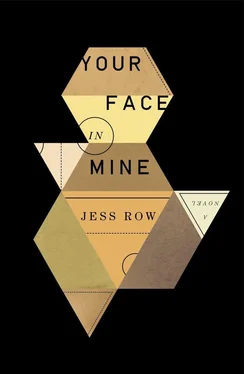What anatomical difficulties?
Because in your case, unlike Martin, there’s no way you can pass without the operation being complete. You understand, right? There’s no halfway point here. Once you go, you go all the way.
I understand.
Immediately after that — really as soon as possible — you have to give me your passport. Altering U.S. passports is an enormous task these days. We have the best technicians working on it, but it can take more than two weeks. Because of all the new security features. What other passports are you going to want? PRC? Taiwan? Singapore?
I can choose more than one?
You can do more or less whatever you want. We’re starting from scratch, aren’t we? The only question is how much you want to spend. And of course, some things are off limits. No one can become a North Korean citizen. The CIA has been trying for sixty years. And of course, outside of the realm of the impossible, there are still time constraints. Complete U.S. or UK or German citizenships take six months. With Scandinavian countries or Canada, if you have enough money, it’s better to start elsewhere and go through immigration. By those standards the PRC is actually extremely easy, if you go through the right channels. We have an ex-PLA contact here in Bangkok who can do it in a week — passports, ID cards, all the relevant databases, everything. I think the going rate is around two hundred thousand baht. That’s about seven thousand U.S. Taiwan is a little more — maybe three hundred thousand. But, of course, as a U.S. citizen you can live in Taiwan as long as you like. It’s all a matter of where you want to feel at home .
How much does changing the U.S. passport cost?
Oh, don’t worry about that. Martin’s covering it. It’s his gift to you. I think he called it your country club initiation fee . You must know what that means better than I do. Of course, you know, U.S. citizenship can be problematic, once you get into a certain income bracket. You might take this opportunity to choose a tax haven. Those are the easiest, of course. The Cayman Islands, for example. Or Monaco. I believe Martin himself has his assets somewhere in the Caribbean. Antigua, or the Virgin Islands.
I’ll have to think about it.
Of course. And we have an accountant, too, who works with us. Kamala. A very nice Indian lady from Singapore with an MBA from the Wharton School. She speaks Mandarin, Cantonese, Toishan, Hindi, Malay, English of course, French, and Italian. She can talk to you about all the financial ramifications. I know that’s not your specialty. Nor mine. The most important thing, frankly, is the narrative. You have to have it down. You have to believe who you are. Or else there’s a risk of a certain schizoid feeling.
You make it sound so straightforward.
One day it will be. All this documentation, it’s just a charade, really. A smoke screen. Soon none of it will be necessary. You know what they do now, with sex changes? Change-of-gender cards. It’s an announcement that comes in the mail, like a wedding or a birth. I will now be known as Martha instead of Mark.
And that’s all right with you?
His smile is almost giddy. There’s something elastic about his limbs, as he crosses his legs, leans back, wiggles the chair a little, getting comfortable.
The need is there, he says. Let’s put it another way. The desire is there. Does this just sound like a pile of crap to you? Stay with me for a minute. Let’s say, just for argument, desire is a kind of a wormhole, a door in time. Any deep human desire is really just an expression of how things will be in the future. How did we get airplanes? As soon as Homo sapiens stood up, he wanted to fly. For a time we thought we would all become angels in heaven. Or flying arhats, or celestial apsaras, in a future life. Then that dream popped like a bubble. Then we built airplanes. Get it? Look around you! Look at yourself, as an example. Your ancestors would think of you as a god. You can fly across the world in a day; you can live just about anywhere you like. Marry anyone you like. How far in the future can it be when people say, I don’t want to be me anymore? Isn’t it just as simple as that? Listen, it’s already happening.
For those who have the resources—
You think this is an argument for decadence? You need to read Marx more carefully.
He slides open a desk drawer and hands me a palm-sized photograph in a battered tin frame. It’s black-and-white, poorly printed, with water stains at the corners: a group of young men in white shirts and dark armbands around a table, talking earnestly, papers and books, flags and batons, piled up in front of them.
I was there, at Thammasat, he says. 1976. That was our Tiananmen Square. Our May of ’68. You don’t know what I’m talking about, do you? Hok Tulaa. The Thammasat University massacre. Don’t feel bad. They don’t even teach it in schools here. But you can go down to the campus and look at the memorial. Suffice it to say this: out of the seven people in that picture, I was the only one who survived. We were the student liaisons to the Federated Trade Unions of Thailand, and when the student rebellion happened, when we took over the campus, we all slept outdoors in the same tent. I just happened to be the one furthest away from the street. When the Red Gaurs came, the paramilitaries, I cut a hole in the side of the tent and ran straight to the river and dove in.
I—
Don’t say anything! You don’t have to express your condolences to me . I’m alive. And their bodies were burned out in the countryside, in pits, so no one could mourn them. Anyway, I escaped. I swam. It was like swimming in motor oil. Eventually a boat picked me up and drove me ten miles upstream. There were Communists all over Thailand in those days. I was handed from one to the other, all the way up to Isaan. I spent three years up there on a commune learning how to grow bananas and sugarcane. And reading Marx, Lenin, Trotsky, Mao, and Ho Chi Minh. Those were the only books we had. Until I finally had my realization. It’s very simple. Too simple, really. Just this: the dialectic is nothing to be afraid of.
He takes a flat cardboard package from his breast pocket, shakes two pieces of gum into his palm, and unwraps them carefully, still looking at me. The writing is in Thai, but I recognize the colors: Nicorette.
I mean, what other conclusion can you draw, from all that analysis, all that modeling, all those patterns? Eventually it’s going to happen as Marx predicted. In the broadest general sense. Capital is not self-sustaining. We know that much. What else have we seen, in our lifetimes? The expansion of the world economy is finite. What we think of as decadence is really only a shadow. Technology is neutral. That’s what medicine teaches us. Stainless steel was first developed for weapons. Now it saves a million lives an hour. Chewing gum. Developed as candy for children, now it’s saving my lungs.
He chews more aggressively, exaggeratedly, to prove his point.
And who are we saving?
Who the hell knows? Excuse my language. But look, Kelly, you’re part of this now. You have to learn to think in larger increments. Decades, not years. Eras, not news cycles.
Millions, not thousands.
Billions, not millions.
He laughs at my face, which, I imagine, has registered some kind of dismay. At what? Being behind the curve?
Want my advice? Leave your Protestant guilt behind. Make that a promise to yourself. Read all those books you never thought you needed. Carnegie. The Art of the Deal. The Seven Habits one. And this, too. He reaches into the lowest drawer of his desk and hands me a battered hardcover without a dust jacket, the corners foxed, the binding split. Awaken the Giant Within. I can’t remember the name, but I remember the teeth: a giant, voracious mouth, a jaw like a moray eel. He had infomercials on late-night TV when I was in high school. Anthony Robbins, Silpa says. Call it trash. Call it vapid. I call it my bible. Does that shock you? Good. That means you’re ready. Read it before we put you under, and you’ll wake up a new human being. Genuinely. No, take that copy! I know it by heart.
Читать дальше












